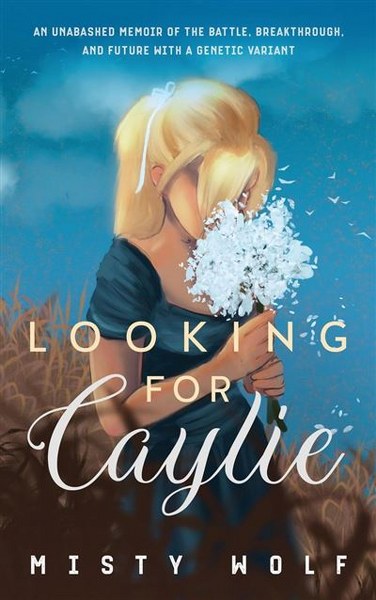When you become a mom, there is forever a piece of your heart out in the world. Try as you might, you will not be able to protect your child from everything. I expected stubbed toes, scraped knees, and maybe even a broken bone or two, but nothing prepared me for the phone call I received that Wednesday afternoon.
“What do you mean, ‘Caylie is missing’?” I asked my mom. “I dropped her off at exactly eight-thirty this morning. I saw her walk through the door.”
“Yes, they said Caylie was in her classes today.”
“Okay, then what’s the issue?”
“I think you should head over here, Misty.”
If things had been usual, I’d have picked Caylie up after school today anyway. But my coursework was heavier for this six-week term, and I was determined to get through this degree on schedule. When Mom and Dad agreed to pick her up, it gave
me the whole unbroken afternoon to work on assignments. Going to Caylie’s school now, for example, would mean more research hours tonight when I seriously needed to sleep.
Suddenly what Mom had said sank in. Lack of sleep I could live with—but my daughter was missing? As the full realization hit me, my heart raced, and a chill up my spine reflected the late winter afternoon. I quickly grabbed my purse and jogged from the house to my car. Once the motor was running and I’d backed out, I pulled out my phone. Of course. Why hadn’t either Mom or I thought of it? No doubt Caylie’s father had picked her up and hadn’t called to let me know. Caylie would sometimes visit her father on Fridays, but today was Wednesday. Regardless, it wasn’t fair to make assumptions.
Instead, I decided to call him.
After three rings, there was the standard faint click to his voicemail.
“Please, please, please tell me you have Caylie,” I recall trying to ask, but it came out begging, “Tell me you picked her up at school, and this is all a big miscommunication.”
Silence.
Why silence?
It took longer than I cared to admit at that moment that, in reality, a voicemail is simply a recording service. I decided that a second phone call was necessary. Our child was missing, and I had questions only he could answer.
The second time through the voicemail, I knew I had to be clear and concise, “Please tell me if you picked up Caylie? If I misunderstood something or forgot something you said, say so.”
We both vowed that, whatever else we did, we’d always stay in touch about Caylie. Maybe we’d talked about something special that would happen today. I didn’t think so, but . . .
A text lit up, and I pulled over to read it.
“I have laryngitis,” Caylie’s father wrote. “I have no voice. If I did, I would be screaming. Where is Caylie?”
If I’d known where Caylie was, I wouldn’t be frantically phoning him, would I? I wouldn’t be begging to know she was with him. If I knew where she was, I wouldn’t be turning into the school parking lot now, and I would know Mom and Dad had picked her up. If I knew where Caylie was, this whole day would not be turning into my personal horror story.
“When I know more, I’ll text you,” I answered, trying hard to sound more sympathetic than I felt.
Nothing seemed real. The ten-minute drive to Caylie’s school felt like hours, like floating through a slow-motion movie, the tension rising second by second, every sound exaggerated—the crunch of a leaf underfoot, the faint swish of your running
shoe on the asphalt. Just when you think you can’t stand the wait any longer, you’re in the building, and my Mom is there.
“What happened?” I asked.
“Your dad and I were over at Jack-In-The-Box getting dinner. We’d brought something for Caylie, and we were about three minutes late getting here. She wasn’t where she always waits for us . . .”
“But Jack-In-The-Box is in the school parking lot. It shouldn’t have made any difference . . .”
“It shouldn’t have.”
“So?”
Mom looked like she was about to cry. “They have people looking everywhere,” she said, “and they’re calling Caylie’s teachers.”
“Well, I dropped her off at school. I watched her go through that door—right there—and she walked past that desk—right there . . .”
“I know you did,” Mom said, putting her hand on my arm.
“Where’s Dad?”
“He’s going toward the 5 freeway and the Old Road.”
“Why?”
“Maybe she went that way.”
“Why would she go that way? I never go that way. She wouldn’t know what was over there. Why would . . .”
“Your dad is just trying to find her, Misty. We’re all just trying to find her.”
Sometimes it takes longer for my brain to compute and process information in a way that makes logical sense. However, it was becoming abundantly clear that my thirteen-year-old, blond-haired, blue-eyed daughter was now a missing person. No one who would have been with Caylie or seen her on a typical school day had any idea where she could be.
While Mom looked downstairs, I ran up the stairs to where most of Caylie’s classes were. I went through each of her classrooms and called her name, opening every door and closet. Desperation was setting in as I searched, and Caylie didn’t appear with some sarcastic comment about being “right there.”
There is a large multi-pane window that spans the upper and lower hallways of the school. When I’d searched every possible place Caylie could be, I looked out and realized that the afternoon light would only last a few more hours. I knew what Caylie was wearing, that she would be cold if the wind kicked up. And did she have a water bottle? Panic was setting in.
I took the elevator down, and when I exited, the voice of Caylie’s upper school principal broke through my foggy thoughts. I remember just staring at her, trying hard not to scream. I’m grateful I didn’t say the words I was thinking. The many voices around me were trying to give me information, effectively making it impossible to process what I was being told or asked. The voices turned to white noise as my panicking mind went through everything I knew to be a fact. Finally, I heard myself demand, “Where is my daughter?”
“We’ve called the sheriff’s department, and we have everyone looking for her.”
I could hear my heartbeat loudly. It was impossible not to think of the countless television news stories that opened with the sheriff’s department looking for a child. I bit my cheek hard enough to hurt before I thought of what to say.
“How could you possibly have lost my daughter?”
“Ms. Wolf, we know Caylie was in all of her classes, and we’ve called all of her teachers. Every one of them saw her walk out with the others in her class.”
“Of course, she was in her classes. I watched her come in through the front door. It was your job to keep her safe until we picked her back up.”
The principal looked beyond distressed. “Can we get you anything?” she asked. “A bottle of water, perhaps?”
“Please don’t change the subject. I moved Caylie here to give her the best education possible, and now she’s missing.” I said much harsher than I had intended.
“We’re doing everything we can, Ms. Wolf. Everyone is working to find her.”
There was nothing more for anyone to say to me. Mom had remained quiet throughout all this, and I silently thanked her for not trying to interfere.
A steady stream of people was coming in and out of the office. I didn’t know who they were or why they were here.
Soon, though, I recognized that two uniformed officers who’d just come in were sheriff’s deputies—a man and a woman. The principal spoke to them and then brought them towards where Mom and I were sitting. I didn’t feel like talking anymore, but I braced myself to cooperate. I knew that the two officers required information to help them with the search, and they would have to ask questions.
“Did Caylie seem upset today?” the uniformed young woman asked.
“She seemed fine. She loves to go to school.”
“Does Caylie have a cellphone?”
“She had one, but she misused it with apps. I plan to get her another one, but I wanted to wait . . .”
“Her grandfather and I are getting it for her for Christmas,” Mom interjected. It was news to me.
The guy was writing on a small, lined pad. “Did Caylie do drugs?” he asked, “or would she be looking for drugs?”
“No and no, she’s a terrific kid who would rather be reading a book. . .”
“Never gets into trouble,” Mom added.
“Is there any reason Caylie would want to run away?” the young woman asked.
I shook my head. “Caylie never spoke to me about running away for any reason. She has everything she could want, and she loves the bookstore and the library. She even collected books from the neighbors and made a library for her classmates at school.”
“Are there friends she might have gone with?”
I was starting to reach my absolute limit with people asking me questions. I had developed a raging headache, and my politeness was continuing to dwindle, “No. Caylie is new to the school. She wouldn’t just walk off with somebody she doesn’t know.”
“Just a couple more questions, Ms. Wolf,” the young female officer continued. “We know you’re tired. Has Caylie ever done this before?”
I wasn’t tired, just incredulous that this was happening.
Caylie wouldn’t disappear on her own. Precious minutes were ticking away, and still, no one had found her.
This book reveals not only an unusual medical condition but also the tremendous struggles parents must go through to get help. Ms. Wolf is intelligent, educated, and resilient and it was still very difficult for her to find the help that Caylie required. For a less educated person, someone who spoke English as a second language, or someone who was struggling with physical or psychiatric issues, working the system would be nearly impossible.
Caylie was misdiagnosed several times and had multiple medications tested on her before the truth about her condition was discovered. She endured confinement in psychiatric hospitals. Thanks to her mother's perseverance, she was not permanently placed in an institution.
This book offers an eye-opening read not only for those interested in medical mysteries but also in its revelations about a system that hinders rather than helps those in need. It is well-written, engaging, and never becomes bogged down in unnecessary details. I give Looking for Caylie five out of five stars.

































